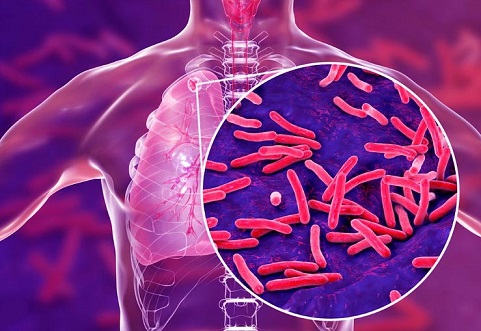Nikhil Prasad Fact checked by:Thailand Medical News Team Jul 20, 2024 9 months, 6 days, 12 hours, 39 minutes ago
TB News: A collaborative research effort has identified a novel method to control Mycobacterium tuberculosis (Mtb) infections. This significant development covered in this
TB News report involves experts from the University of British Columbia (UBC)-Canada, Martin-Luther-Universität Halle-Wittenberg-Germany, The Francis Crick Institute-UK, and Kinexus Bioinformatics Corporation-Canada. The study focuses on the enzyme Glycogen Synthase Kinase 3 (GSK3) as a potential target for combating tuberculosis (TB), a disease that continues to affect millions worldwide.
 Breakthrough research unveils new strategy to combat Tuberculosis
Background
Breakthrough research unveils new strategy to combat Tuberculosis
Background
Glycogen Synthase Kinase 3 (GSK3) is an enzyme involved in various cellular processes, including metabolism, cell cycle regulation, and immune responses. Inhibiting GSK3 has been shown to significantly reduce the growth of Mtb within human macrophages, which are the cells that TB bacteria typically infect and use to proliferate.
Research Methodology
The researchers employed a phenotypic screen of a kinase library to identify compounds capable of inhibiting GSK3. This approach allowed them to identify several compounds that effectively curtailed Mtb growth in both human THP-1 cell lines and primary human monocyte-derived macrophages (hMDM). Advanced genetic techniques, such as CRISPR knockouts and siRNA silencing, were used to confirm the necessity of GSK3 isoforms for Mtb growth.
Key Findings
I
dentification of Effective Compounds
The study identified GSK3 as a viable target for host-directed therapy (HDT). A wide range of GSK3 inhibitors were found to be active against intracellular Mtb. Initial screening identified 103 active compounds, with GSK3 inhibitors standing out for their significant inhibition of Mtb growth within macrophages.
Potent Compound: P-4423632
Among the identified compounds, P-4423632 emerged as a particularly potent inhibitor of GSK3β. This compound was shown to induce apoptosis (programmed cell death) in macrophages, a defense mechanism that Mtb typically suppresses to survive within host cells. The study demonstrated that GSK3 inhibition led to a substantial increase in macrophage apoptosis, reducing the survival and proliferation of Mtb within these cells.
Genetic Validation
Further validation using genetic approaches confirmed the crucial role of GSK3 in controlling Mtb infection. Both siRNA down-regulation and CRISPR inactivation of GSK3α and GSK3β resulted in a marked reduction in Mtb growth within macrophages. This genetic evidence supports the potential of targeting GSK3 as an HDT for TB.
Apoptosis and Cellular Signaling
A significant aspect of the study was the observation that GSK3 inhibition promotes apoptosis in infected macrophages. Mtb has evolved mechanisms to suppress macrophage apoptosis,
enabling its survival within host cells. By inhibiting GSK3, the compound P-4423632 effectively reverses this suppression, leading to increased macrophage apoptosis and subsequent reduction in Mtb survival.
Phospho-Proteome Analysis
The phospho-proteome analysis provided deeper insights into the cellular mechanisms affected by GSK3 inhibition. The analysis identified several key signaling pathways and proteins modulated by GSK3 inhibition during Mtb infection. These include pathways involved in cell survival, apoptosis, and immune responses. The data suggest that targeting GSK3 can disrupt the intricate network of signals that Mtb manipulates to ensure its survival within host cells.
Broader Implications
Remarkably, P-4423632 was also found to be effective against other intracellular pathogens, such as Campylobacter jejuni and Salmonella enterica serovar Typhimurium. This broad-spectrum activity suggests that GSK3 inhibitors could be valuable in treating a variety of bacterial infections that utilize similar strategies to evade the host immune system.
Moving Forward: Future Directions
While these findings are promising, the researchers emphasize the need for further studies to fully understand the mechanisms by which GSK3 inhibition controls Mtb infection. They also call for in vivo studies to validate the efficacy and safety of GSK3 inhibitors in treating TB.
Conclusion
The discovery of GSK3 inhibitors as potential host-directed therapies opens a new frontier in the fight against TB. By targeting the host's cellular pathways rather than the pathogen directly, this approach offers a novel way to enhance the body's innate immune response and reduce the likelihood of antibiotic resistance.
The promising results of this study suggest that GSK3 inhibitors could become an essential tool in the treatment of TB and potentially other bacterial infections. Continued research and clinical trials will be crucial in translating these findings into practical treatments.
The study findings were published in the peer-reviewed journal: iScience.
https://www.sciencedirect.com/science/article/pii/S2589004224017802
For the latest
TB News, keep logging on to Thailand Medical News.
Read Also:
https://www.thailandmedical.news/news/south-korean-researchers-warn-that-tuberculosis-increases-risk-of-various-cancers
https://www.thailandmedical.news/news/medical-thailand-thai-study-validates-that-covid-19-induced-immune-dysfunction-is-driving-increased-incidence-of-pulmonary-tuberculosis
